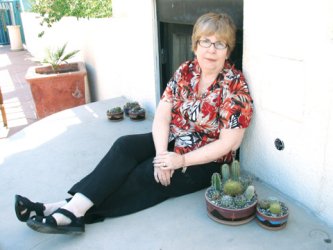Excerpts from the interviews:
“There was a very active Pittsburgh fan group in the '40s and '50s, but by the '60's they all became inactive. In the book department of a major department store, where I worked part-time, I met a fellow employee named Art Vaughan who was a member of a fledgling science fiction club based at Carnegie-Mellon University (then still Carnegie Tech). Three undergraduate women were starting up the Western Pennsylvania Science Fiction Association (affectionately referred to as WOOPSPA). CMU is a technical school, but these women weren't techies; they were science fiction readers and fans. I started going to the meetings and became one of the four 'founding mothers.' Most of the people in the club were Carnegie-Tech students or the kids of professors (there were two frighteningly bright 14-year-old boys), plus some high school students.
“In 1968 we decided to go to a convention. None of us had been to one before, but I knew about Worldcons from the Judy Merril anthologies. We went to DisClave, the Washington DC regional convention. Foolishly, we all decided to wear black and wear numbers around our neck on thongs, to forge a collective identity -- 13 to 16 people, of whom eight or nine were women. In 1968 there were virtually no women in fandom. So we would have made an impact, even without the 'uniform!' We met Bob Silverberg, and Lester del Rey. Silverberg in particular was bemused by all of us -- later he sort of 'adopted' us.”
*
“I still do exactly what I've been doing for 22 years (except that as your title changes you have to go to many more meetings!); I'm an acquisitions editor. Berkley and NAL, the mass-market arms of Putnam and Viking/Dutton, are unusual because everybody who acquires works on their own projects -- they don't hand them off. So we buy things, then do the whole process personally. In both book and magazine publishing, you need 'marquee names' (that's my term), and you may buy something because you know that name is going to sell. For a magazine it's one person buying and trying to balance the well-known and the lesser-known. Most book lines (except for Tor, which has 102 consulting editors) have two or three people doing that; we have five.
“Still, there has to be somebody who's going to make the final decisions, and that's usually the person who's called editor-in-chief. For us, that's somewhere between me and Susan Allison. We kind of decide together what's going to go on what list, how things should be be balanced, what should and shouldn't be bought, so for the most part it's not one person's choice. Unlike DAW or Baen, Ace/Roc are not lines that reflect the taste of one or two individuals.
“Having said that, Roc and Ace are not the same at all, and since they've been merged editorially we've made great efforts to keep that distinction. I have perforce become the hard science fiction editor. Susan has more literary tastes. Anne Sowards came out of the BYU science fiction club where she was the managing editor of the magazine, and she has solid commercial fantasy taste. Liz Scheier, who handles a lot of the Roc Books, has a sensibility that fits perfectly with what Roc does. Jessica Wade, the assistant editor, is a talented young woman who has an interest in fantasy that skews more to young adult, and cross-over fantasy. Which is good because we are all buying that these days! It's a good mix of people, and we've built a large, interesting and diverse list. (Ace does five books a month and Roc does three -- that's a lot of books.)”
*
 “We seem to be the only house doing well with hard science fiction. We're William Gibson's publisher (yes, he left us for two books, but he came back) and Frank Herbert's and later Heinlein. That's given us something to talk about that many other lists can't. It's this weird self-fulfilling prophecy -- 'Ace can sell hard science fiction because Ace can sell hard science fiction' -- which has worked to our advantage. The other advantage is the history: Ace was founded in 1953. You can talk about what we've accomplished over 50 years and it does in some weird way carry weight. It allows us to buy Alastair Reynolds and Charlie Stross, John Varley and William Dietz, Jack McDevitt and Allen Steele and keep publishing them well.”
“We seem to be the only house doing well with hard science fiction. We're William Gibson's publisher (yes, he left us for two books, but he came back) and Frank Herbert's and later Heinlein. That's given us something to talk about that many other lists can't. It's this weird self-fulfilling prophecy -- 'Ace can sell hard science fiction because Ace can sell hard science fiction' -- which has worked to our advantage. The other advantage is the history: Ace was founded in 1953. You can talk about what we've accomplished over 50 years and it does in some weird way carry weight. It allows us to buy Alastair Reynolds and Charlie Stross, John Varley and William Dietz, Jack McDevitt and Allen Steele and keep publishing them well.”
*
“I've never worked anywhere but Putnam/Berkley/Ace. (We're Penguin USA now, but the core company is still there) Putnam was a company that published hardcover bestsellers by very mass-markety authors, so the entire culture of Putnam and Berkley was commercial. I'm a commercial reader -- always have been, and I'm not apologizing for that -- so fortuitously, serendipitously, I wound up at the right publishing company. It can be well-written (I always try to buy books that are well-written); it can entertain people, and also make people think. This is what I buy!”


